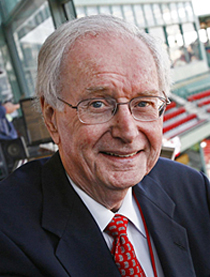
Culture

Flavin
At last, the baseball season has begun. The games really count for something, as opposed to the 162 game schedule when the teams fight it out to see which ones will gain home field advantage, an advantage that could be wiped out after a single contest should the visitors happen to win it.
The post-season is, in the final analysis, the real season. It's that time of year when, for better or for worse, reputations are made and legacies established. Who, for example would even remember Russell Earl Dent if he hadn't hit a fly ball that snuck over the wall in Fenway Park's left field 40 years ago? It is because of that he is famous, or infamous, depending on your outlook; he will always be remembered by Red Sox fans, not by his given name, but as Bucky "Bleeping" Dent.
Carlton Fisk is recognized as one the greatest catchers in baseball history; he caught 2,226 games over 24 seasons, but when people think of him they picture him waving fair his dramatic home run in Game Six of the 1975 World Series.
David Ortiz hit 541 regular season home runs but he will forever be lionized for his post-season dramatics; the two walk-off, game winning hits, one of them a home run, in the Red Sox miraculous rise from the dead in the 2004 American League Championship Series; and the epic grand slam that sent Tigers' right fielder Torii Hunter tumbling into the Red Sox bullpen and the Tigers tumbling to defeat in the 2013 ALCS.
Curt Schilling was a terrific big-game pitcher. He has made headlines since his baseball days with his outspoken and controversial right-wing political views and for the high-profile flame-out of 38 Studios, his video game company, but his baseball legacy is unquestioned. It is rooted in the famous "Bloody Sock" game, when he battled through the pain of an injured ankle to win Game Six of the 2004 ALCS.
Another legend came to fruition in that historic 2004 Red Sox-Yankees playoff series. It had all started back on July 31st of that year, the trading deadline. The baseball world was rocked that day by news of the Red Sox trade of Nomar Garciaparra, the face of the team's franchise, so no one paid much attention to another deal the Red Sox made that same day. They traded Henri Stanton, a lifetime minor leaguer, for a utility outfielder whose outstanding characteristic was that he could run, which is what the Sox were looking for. His name was Dave Roberts.
So it was that in the ninth inning of game four of the ALCS, with the Red Sox down, three games to none and trailing in the game, four to three, on the precipice of being swept by their archenemies, Roberts was sent in as a pinch runner for Kevin Millar, who had walked. Everyone in the park and at home watching on television knew that Roberts was in the game for only one reason: to steal second. Yankees closer Mariano Rivera threw over to first three times before delivering a first pitch to the batter, Bill Mueller. On his second throw, he nearly picked off Roberts. Finally, Rivera pitched to the batter, and, as everyone expected, Roberts took off for second. Catcher Jorge Posada gunned a perfect throw to shortstop Derek Jeter who applied the tag -- a millisecond too late. "Safe!" ruled umpire Joe West.
We all know what happened next. Mueller hit a sharp single up the middle and Roberts came around to score, tying the game. Three innings later, Ortiz won it with a homer to right, and the Red Sox were on their way to a championship.
Roberts never made a single plate appearance in that entire post-season run, and he never played in another game for the Red Sox after 2004. He was off to San Diego the following year with a lucrative contract, and his baseball travels would eventually land him as manager of the Los Angeles Dodgers, a potential 2018 World Series opponent of the Red Sox. But he will never have to buy another drink in Boston because he came through on the big stage when all eyes were upon him.
It doesn't always end that way.
Bill Buckner was an admirable player. He had a well-earned reputation as a clutch performer; he played hurt; he always put his team first; he was a former batting champion; he had a total of 2,715 base-hits, more than Ted Williams or Joe DiMaggio or Mickey Mantle; and yet....
Mistakes happen. Sometimes, not often, but sometimes, a control pitcher will unleash a wild pitch, or a gold glove outfielder will drop a fly ball, or an infielder will let a routine grounder go between his legs. There's no explaining it, it just happens.
It happened to Bill Buckner at the worst possible time in 1986 when the spotlight was at its brightest and most unforgiving. The Red Sox had been only a strike away from winning their first World Series since 1918 when a ground ball went between Bill Buckner's legs and in that instant his baseball legacy was changed for all time. Technically it did not cost the Red Sox the championship, there was still a seventh game to be played, but that's not how the story line goes. For all his accomplishments, when Buckner's obituary is written it will say, "Bill Buckner, the man who let a ground ball go through his legs in the 1986 World Series...."
Is that fair? No, but that's how high the stakes are at this time of year. Not every post-season has the drama of a 1986 or a 2004; not all of them have such identifiable heroes or goats. What they have in common is that they're for all the marbles. Either you win or you go home. This year, as in every year, every team except one will end up going home.
The team that's left will go on tour with the World Series trophy.
- Dick Flavin is a New York Times bestselling author; the Boston Red Sox “Poet Laureate” and The Pilot’s recently minted Sports’ columnist.
Recent articles in the Culture & Events section
-
'Dignitas' and the mediaRussell Shaw
-
Scripture Reflection for April 14, 2024, Third Sunday of EasterDeacon Greg Kandra
-
St. Helena's House is established in the South EndThomas Lester
-
Is this synodality?Russell Shaw
-
Poking the hornet's nest of IVFFather Tadeusz Pacholczyk


















